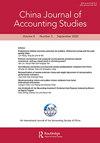Does employee representation affect corporate investment efficiency? Evidence from China’s capital market
Q4 Business, Management and Accounting
引用次数: 0
Abstract
ABSTRACT This paper is the first empirical study of the economic consequences of the adoption of the employee director system in China from the perspective of the investment efficiency of enterprises, that is, based on empirical study of China’s capital market in order to test the relationship between employee directors and the investment efficiency of listed companies. The results show that employee directors can improve the investment efficiency of listed companies effectively, and this relationship is more significant for state-owned enterprises and enterprises in product markets with low levels of competition. Further research shows that employee directors can restrain not only overinvestment but can also reduce underinvestment. Employee directors can restrain the overinvestment behaviour of state-owned enterprises effectively and reduce underinvestment by non-state-owned enterprises. In product markets with low levels of competition, employee directors can restrain overinvestment, while in product markets with high levels of competition, employee directors can reduce underinvestment.员工代表是否影响企业投资效率?来自中国资本市场的证据
摘要本文首次从企业投资效率的角度对中国采用员工董事制度的经济后果进行实证研究,即基于中国资本市场的实证研究,以检验员工董事与上市公司投资效率之间的关系。结果表明,员工董事能够有效提高上市公司的投资效率,且这种关系在国有企业和竞争程度较低的产品市场企业中更为显著。进一步的研究表明,员工董事不仅可以抑制过度投资,还可以减少投资不足。员工董事可以有效抑制国有企业的过度投资行为,减少非国有企业的投资不足。在竞争水平低的产品市场中,员工董事可以抑制过度投资,而在竞争水平高的产品市场中,员工董事可以减少投资不足。
本文章由计算机程序翻译,如有差异,请以英文原文为准。
求助全文
约1分钟内获得全文
求助全文
来源期刊

China Journal of Accounting Studies
Business, Management and Accounting-Business, Management and Accounting (all)
CiteScore
0.70
自引率
0.00%
发文量
19
审稿时长
6 weeks
 求助内容:
求助内容: 应助结果提醒方式:
应助结果提醒方式:


